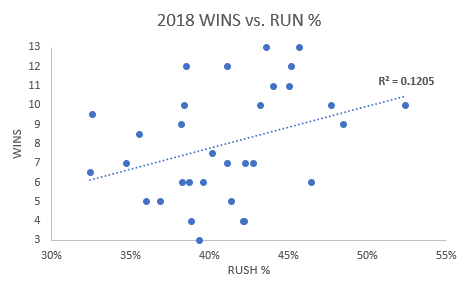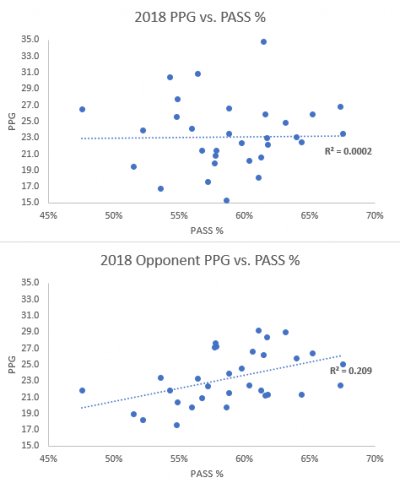Popeyejones
Active member
- Joined
- Aug 20, 2013
- Messages
- 5,525
- Reaction score
- 0
Tical21":1na7arj5 said:EPA is shite. It isn't an efficiency metric. You aren't trying to score a touchdown on every play. Its skewed towards being clutch. DVOA is a far better efficiency metric.Popeyejones":1na7arj5 said:A few different things, which I'm going to bullet point, just for ease of reading:
*The basic gist of the article is that in the relationship between run plays + completions and winning, Schotty is confusing the cause for the effect and the effect for the cause. He thinks that the play distributions he wants causes winning but it's the reverse: winning causes the play distributions he's trying to target. Worth noting is that he's not alone in this, as Bill Belichick has made the same mistake in the past.
*The way you get around all of this cause and effect stuff is to look at expected-points-per play for running and passing, which is what people do. And the data on that is very clear: All things being equal pass plays are more effective than run plays. This is partially driven by innovations in passing attacks in the last 20 years, but also explains why almost all teams most of the time are now passing the ball much more than they used to.
*Ben Baldwin isn't an outlier on any of this, so going after him for this is kind of missing the point. Many, many people have studied this, and I'm unaware of anyone who has seriously studied it and not come to the same basic conclusion as Baldwin does.
*If you want to see the consequences of running so much on overall offensive effectiveness, the Seahawks are actually a great example. On a per-play basis last year the Seahawks had the 14th most effective offense in the NFL. That's very middle of the pack, but is only a problem because both in their passing attack AND in their running attack the Seahawks were actually really good. They had the #6 ranked passing attack AND the #6 ranked rushing attack. How do you end up with a Top 6 rushing attack AND passing attack but only end up middle of the pack for overall offensive attack? There's only one way: you're simply rushing the ball way too much and teams with inferior passing and rushing attacks are passing more than you and flying by you in overall offensive effectiveness.
Russell had by far his best year, the Seahawks had an outstanding year despite mediocre talent, and everyone wont stop saying they should have passed more. Its unbelievable really. It's like nobody watched any of the past three seasons.
Baldwin skews all his stats to match his narrative. Omitting 4th quarter and 4th down runs? Wtf is that? I can make stats look how I want too.
Theres no correlation between running success and play-action success, except Russ was far more efficient and completed at a 3% higher rate last year than the previous two. That's where the "no correlation" crowd goes silent and goes back to try to skew their spreadshseets.
As I recall in #4 I'm referencing DVOA, not EPA, so this argument doesn't really apply. AFAIK this is a finding that's been replicated regardless of which positive outcome you put on the left hand side (winning, DVOA, EPA, etc)
Regarding EPA, it's probablistic based on down, distance, and field position. Saying it's just measuring clutchness doesn't make much sense, given that as far as we can tell, to the degree that clutchness exists at all, if it does exist it doesn't exist enough to warrant talking about.


